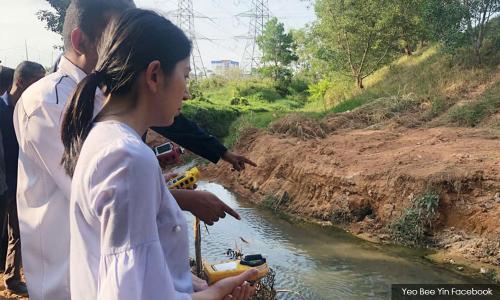Unsustainable development blamed for Pasir Gudang incident
Energy, Science, Technology, Environment and Climate Change Minister Yeo Bee Yin today cited non-sustainable development in Pasir Gudang, Johor, for what she said is the long-term negative impact on the environment.
The non-sustainable development resulted in the absence of a buffer zone between the chemical-based industries and schools, houses and community activity centres, thus putting the people at risk of a chemical disaster, she said.
Pasir Gudang has 2,005 licensed factories, of which 250 are chemical-based, she told a media conference in the wake of the incident where students and other people in the area experienced breathing difficulties over the past week that required more than 700 people to seek treatment. Health Minister Dr Dzulkefly Ahmad was also present at the media conference.
Yeo pointed out that rapid development and a high density of chemical-based industries in the district are the major contributors to the impact on the environmental carrying capacity, including the air, land and rivers
“Non-sustainable development has caused the environment to become saturated with various suspended gases or vapours and uncontrolled release of effluents into drains and water channels that caused the environment to become unstable and extremely sensitive,” she said.
Buffer zone absent
Yeo said the buffer zone factor was not taken into account when the construction of the factories was approved, thus resulting in schools located close to the factories, some just 300 metres away.
For that, she said, the ministry will take immediate steps, including conducting a loading capacity analysis and providing a buffer zone, to reduce the risk of chemical disasters.
Asked whether the government will relocate the chemical plants to create the buffer zone, Yeo said the matter came under the jurisdiction of the Johor government.
"The Johor Menteri Besar (Datuk Dr Sahruddin Jamal) is very committed to making sure that the planning of Pasir Gudang will be more sustainable than what we see today," she said.
Automated monitoring
Yeo said the ministry will also build an automatic gas-detection station that can provide a more efficient and speedy warning of a chemical disaster.
She said Pasir Gudang will be the first heavy industries area to have an automatic environmental quality monitoring system in the country to help the authorities act more proactively.
She also said that the ministry will establish a system to determine the air carrying capacity in Pasir Gudang using the Air Dispersion Modelling method in practice in the developed countries.
She said the target is to implement these proposals by the end of this year.
Yeo said the ministry will also hold a town hall session with the chemical industries in Pasir Gudang on Monday.
"We are going to talk about the precautionary steps that we can take to avoid this and how we can do the monitoring more holistically. Therefore, chemical industries in Pasir Gudang need more responsibility to make sure the public health is being taken care of," she said.
Asked whether there are other industrial areas in the country also at risk like Pasir Gudang, Yeo said the incident in the district is a wake-up call for the government to pay attention to industrial areas.
However, she said, the development of chemical industries in Pasir Gudang is far more intensive than in other areas and there has been a history of air pollution in the district that has received little media coverage.
- Bernama
RM12.50 / month
- Unlimited access to award-winning journalism
- Comment and share your opinions on all our articles
- Gift interesting stories to your friends
- Tax deductable

